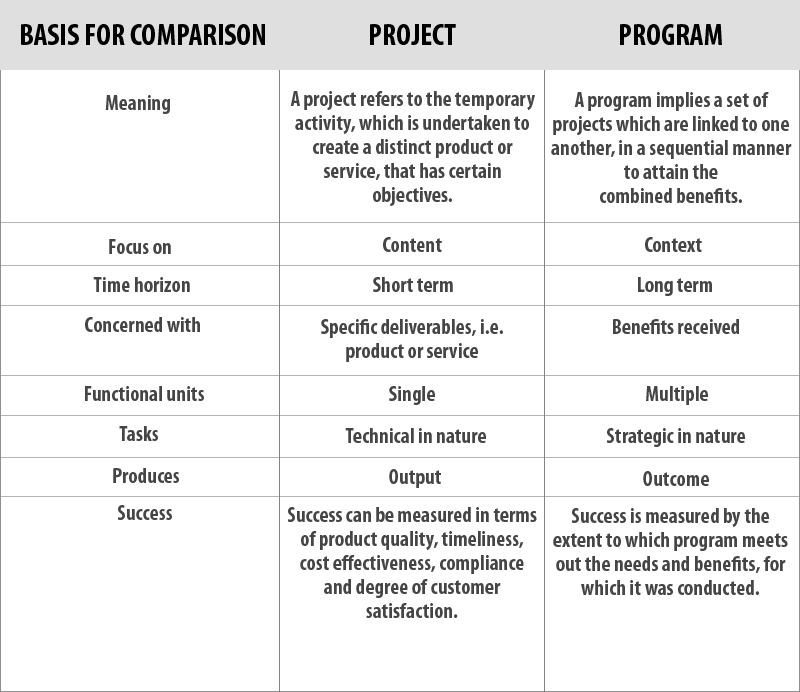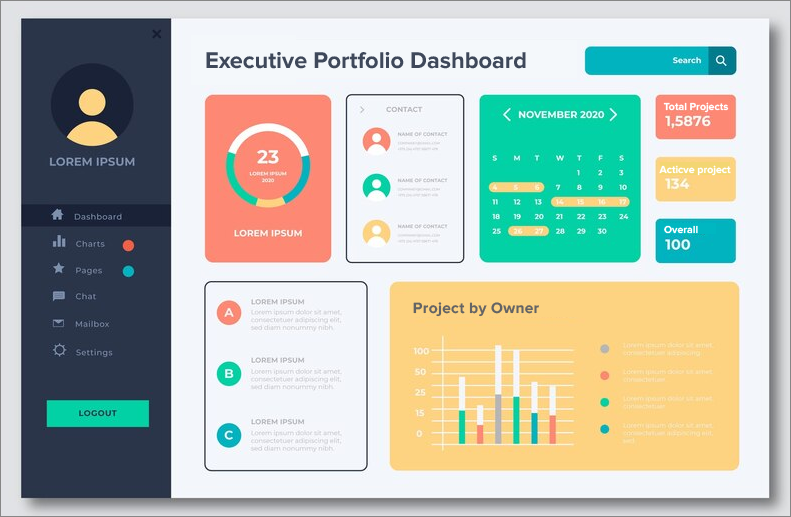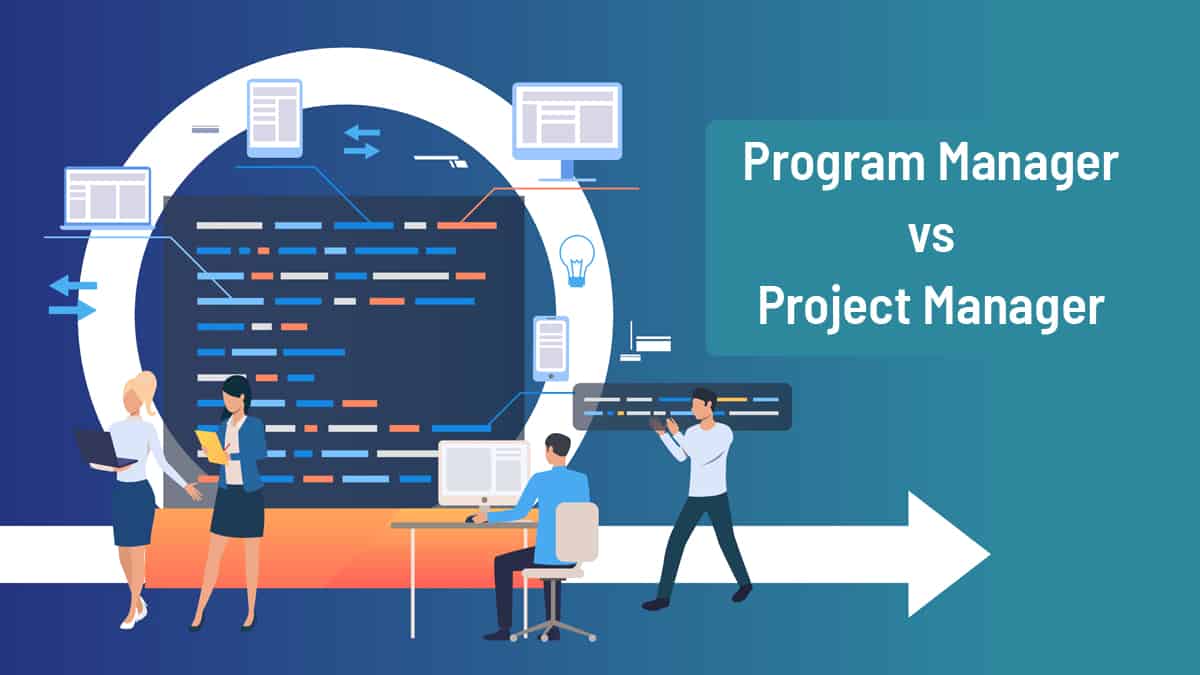Despite the similarity in their titles, program managers and project managers fulfill distinct roles. Understanding these differences is crucial for those considering a career in either field or looking to comprehend how the two can collaborate effectively. This post explores the differences between program manager vs project manager, their respective salaries, and how they can synergize.
Programs vs. Projects
Before delving into the roles, it’s essential to differentiate between projects and programs. Projects are typically short-term, one-time initiatives with defined cost limits, resource availability, budgets, and timelines. They have specific deadlines and short-term objectives, culminating in tangible outcomes or products.
Conversely, programs consist of multiple interconnected projects aimed at achieving broader, long-term business objectives. A successful program contributes to a company’s growth and development beyond just producing a singular output.
Program managers play a pivotal role in ensuring the alignment of projects with the company’s strategic goals, while project managers focus on executing those projects efficiently, collectively driving growth and success for the development company.
Examples – Programs vs. Projects

To illustrate the distinction, consider these examples:
Suppose a company aims to increase engagement with Chief Information Officers (CIOs) for its products or services. It might launch a program targeting CIOs, encompassing various tasks like creating a guidebook for CIOs and hosting a webinar specifically for them.
Alternatively, consider a project focused on enhancing the onboarding process for new employees. This project may involve several smaller tasks, such as gathering feedback from new hires, developing checklists and guidelines, and standardizing an orientation presentation.
It’s important to remember that a program is an ongoing, long-term endeavor, while a project is a one-time, finite task. Typically, a program is composed of multiple projects, each contributing to a larger, overarching goal. Let’s delve into some detailed examples.
IT System Upgrade
Project
A company initiates a project to enhance its IT system’s security, functionality, and capabilities. This project has defined objectives, a specific timeline, and a designated project manager responsible for tasks such as assessing the current system, planning upgrades, acquiring necessary hardware and software, and coordinating with the IT team.
Program
Concurrently, the organization identifies several interconnected projects essential for achieving broader IT objectives. These might include upgrading the computer system, implementing a new customer management system, and conducting employee cybersecurity training.
These projects are collectively managed under a program. The program manager ensures that all projects are synergistically executed, aligned with the organization’s goals, and resource-optimized.
Key Difference
In this scenario, the IT system upgrade is a discrete project with specific goals and a defined endpoint. The program, however, encompasses a range of projects that collectively aim to achieve comprehensive IT objectives, including enhanced security, improved efficiency, and employee education.
Product Development
Project
A company embarks on a project to develop a new product, such as a smartphone, to expand its market offering. The development process involves market research, design, prototyping, manufacturing, and marketing. A project manager is appointed to ensure the product’s timely and budget-compliant development.
Program
Simultaneously, the company identifies additional projects that support its broader product development strategy. These may include enhancing the online shopping platform, refining delivery processes, and creating advertising campaigns for various products.
The program manager coordinates these projects, ensuring they collectively support the company’s product development objectives and that resources are efficiently allocated across projects.
Key Difference
The project focuses on developing a specific product – in this instance, a new smartphone. In contrast, the program consists of various projects that together facilitate the company’s overarching goal of improving product development.
Employee Training
Project
A company, recognizing the need for its employees to acquire new skills due to industry changes, initiates a project to implement a new online training system. This project encompasses selecting a learning platform, developing training materials, and deploying the system. The project manager is responsible for ensuring the successful completion of these tasks.
Program
However, the company acknowledges that employee development extends beyond simply using a Learning Management System (LMS). Therefore, a program is established to oversee various initiatives, including the implementation of the new LMS, the creation of leadership training programs, and the initiation of mentorship schemes. The program manager ensures that these collective efforts align with the company’s long-term training and development objectives.
Key Difference
While the LMS implementation is a specific project with defined timelines and objectives, the broader program encompasses multiple projects aimed at holistic employee training and development, reflecting the organization’s comprehensive strategy for workforce skill enhancement.
Also Read: Outsourcing Web Development: Finding Your Tech Ally in 2024
Who is a Program Manager Mean?
A program manager is responsible for outlining the strategy and objectives of a program and assessing its impact on the business. They oversee and coordinate the various projects necessary to achieve the program’s overarching goals.
Think of a program manager as an architect who designs a building. Just as architects ensure that every component of a building harmoniously integrates to create a cohesive structure, a program manager orchestrates the completion of individual projects to ensure the success of the entire program.
Their role involves assembling and leading teams, implementing plans, measuring the effectiveness of their strategies, and prioritizing critical projects. For instance, in our CIO-focused program, a program manager would ensure cohesive teamwork across project teams and determine if targeting CIOs effectively contributes to client acquisition.
Who is a Project Manager Mean?
Project managers are responsible for ensuring the smooth operation of each aspect of a project. Their key duties include completing projects on time, staying within budget, and effectively using available resources. They also keep the program manager informed about the project’s progress and any deviations from the original plan.
The role of a project manager is more focused on the practical details compared to that of a program manager. While program managers oversee the broader strategy, project managers handle the meticulous execution of specific tasks.
Their primary focus is on implementing and controlling the operational aspects of the project, ensuring timely completion, cost efficiency, task delegation, and achieving project goals.
Program Manager vs Project Manager – Comparison

Let’s summarize the three main differences between program managers and project managers:
- Scope of Work: Program managers oversee multiple projects, while project managers are responsible for individual projects.
- Focus: Program managers concentrate on long-term, overarching goals for the organization, whereas project managers focus on immediate, specific tasks.
- Strategy vs. Execution: Program managers develop and implement long-term strategies, while project managers execute specific short-term tasks.
Key Responsibilities
Project Manager: Ensures that each project is completed on time, within budget, and meets its objectives. Responsibilities include defining project goals, planning, allocating resources, managing risks, and coordinating team members to achieve project targets.
Program Manager: Manages multiple projects that collectively aim to achieve broader organizational goals. Their role extends beyond individual project oversight; they also plan and collaborate to ensure alignment with organizational objectives. Program managers oversee resource allocation across projects, manage the interdependencies between projects, and provide comprehensive progress reports to stakeholders.
Project managers excel in detailed planning and execution of individual projects. Program managers, on the other hand, are adept at overseeing multiple projects simultaneously, ensuring alignment with broader organizational goals.
Scope of Work
Project Manager: The project manager is responsible for planning, executing, and monitoring a project. This involves setting project objectives, creating detailed schedules, efficiently utilizing resources, and addressing potential obstacles to timely completion. The scope encompasses what must be accomplished within the constraints of time, budget, and quality.
Program Manager: Program managers operate on a broader scale, coordinating and overseeing multiple interconnected projects within a program. Their focus extends beyond individual project success to achieving the overall objectives of the program. The scope involves ensuring project synergy, optimal resource utilization, and assessing each project’s contribution to the program’s success.
Understanding and clearly defining the scope is crucial for the success of any project, ensuring alignment with organizational goals, recognition of limitations, and delivery of desired outcomes.
Also Read: The IT Outsourcing Boom: 12 Reasons Why India Leads
Decision-Making Authority
Project Manager: Project managers have decision-making authority within their specific projects. They oversee planning, execution, and risk management, making choices that directly impact project outcomes. This includes decisions on resource allocation, task prioritization, and problem resolution within the project.
Program Manager: Program managers make critical decisions across multiple projects, impacting overall program effectiveness. Their decisions involve resource distribution among projects, prioritization of projects, and resolving inter-project conflicts. They often collaborate with senior leadership to align program goals with the organization’s vision. The decisions they make significantly influence the collective success of the projects under their purview.
Stakeholder Management
Project Manager: Project managers focus on managing stakeholders directly involved in their projects. They identify key stakeholders, understand their needs and expectations, and ensure effective communication throughout the project lifecycle. This involves regularly updating stakeholders on project progress and addressing their concerns and issues.
Program Manager: Program managers engage with a diverse range of stakeholders across multiple projects. Their role entails ensuring alignment and cooperation among all parties involved in the program, from project teams to senior organizational leaders. They must balance varying stakeholder needs, striving to ensure satisfaction and alignment with the program’s objectives and the organization’s overarching goals.
Risk Management
Project Managers: They focus on identifying, assessing, and mitigating risks specific to their projects. They develop risk management plans, monitor potential issues, and implement strategies to minimize the impact of risks on project objectives. Their role involves handling daily risks within their projects.
Program Managers: In contrast, they manage risks at a broader level, addressing risks that could impact multiple projects within a program. They analyze risks holistically, considering interconnected risks and their potential cumulative effect. Their strategies aim to mitigate issues that could jeopardize the program’s overarching goals. Collaboration in risk management, smart resource allocation, and aligning risk mitigation efforts with organizational objectives are key to achieving broader organizational goals.
Resource Management
Project Managers: They allocate and manage resources for their individual projects. This includes determining resource needs, estimating required quantities, assigning tasks to team members, and ensuring efficient resource utilization to achieve project objectives. Their expertise lies in managing project-specific resources.
Program Managers: They oversee resource management across multiple projects within a program. They ensure equitable and effective distribution of resources, addressing any resource shortages. Their goal is to strategically allocate resources for maximum impact across all projects in the program, ensuring alignment with organizational goals. They facilitate resource-related problem-solving and enhance communication among project managers to optimize resource usage across the program.
Schedule Management
Project Managers: They focus on detailed scheduling for their projects. They create project timelines, set milestones, and maintain schedules to track progress. Vigilant monitoring of progress, adapting schedules as needed, and ensuring timely project completion are key responsibilities.
Program Managers: They ensure the timely execution of all projects within a program. They oversee the alignment of individual project schedules, manage interdependencies, and integrate them into the overall program timeline. Handling scheduling conflicts and adjustments to optimize the program schedule is part of their role. They collaborate with project managers to align each project’s schedule with the program’s broader objectives, ensuring cohesive scheduling across the program.
In summary, project managers excel in managing the specifics of their projects, while program managers take on a larger role, overseeing schedules for a group of interrelated projects to fulfill the overall objectives of the organization.
Career Progression
Project Managers: They typically advance in their careers by managing increasingly larger and more complex projects. Starting with smaller projects, they gradually take on more significant challenges, gaining expertise in specific industries or methodologies. Career advancement for project managers is often marked by their ability to consistently deliver successful projects, demonstrate effective leadership, and attain advanced project management certifications.
Program Managers: On the other hand, they progress by overseeing multiple projects within a program, rather than focusing on a single project. Effective program managers excel at multitasking, ensuring cohesive operation among different project components, and aligning projects with the company’s strategic objectives. As they gain experience, they may handle larger and more critical programs, showcasing their ability to add value to multiple projects simultaneously. Key skills for a program manager’s career advancement include leadership, strategic planning, and the ability to orchestrate diverse projects.
How do Project and Program Managers Collaborate With Each Other?
In many organizations, both project and program managers play pivotal roles. Understanding their distinct responsibilities is crucial, yet their roles often overlap in several areas. For example, both roles involve monitoring progress, but they may approach it differently.
The program manager oversees the implementation of the overall program, while the project manager tracks specific tasks and deadlines within the project. Often, the program manager supervises the project manager, but in some cases, they collaborate as equals to drive projects and the broader program toward success.
Effective collaboration between project and program managers is characterized by:
- Consistent and clear communication within and across teams.
- Ensuring clarity of roles and responsibilities.
- Developing strategies to propel projects and programs forward.
- Setting explicit expectations for focus areas.
- Utilizing tools for comprehensive visibility of projects and programs.
The specific dynamics of collaboration between project and program managers can vary across organizations. The key is to establish a working relationship that is effective and conducive to the organization’s goals.
How Much Money Does a Program and a Project Manager Make?
One common question is: What are the salary ranges for project managers and program managers? And do they earn similar amounts?
A project manager’s salary typically ranges from $72,000 to $113,000 annually, averaging around $90,000 per year. However, this can vary significantly based on the specific role, industry, and required skills. For example, a construction project manager usually earns about $75,000 annually, while an IT project manager averages $89,000 per year. In engineering project management, the highest-paying roles can average over $119,000 annually.
Thus, project manager salaries depend on the job type, location, and level of experience. If you’re interested in becoming an IT or construction project manager, exploring the field further is advisable.
As for program managers, their salaries also depend on factors like industry, location, and experience. On average, program managers earn slightly less than project managers, with an average annual salary of about $79,565.
Program and a Project Manager – Roles and Challenges
Both program and project managers share the challenges of maintaining organization and efficiency. They often employ similar methods and tools:
Dashboards: Essential for providing a comprehensive view of task progress and status, especially in complex projects with multiple participants. Managers benefit from dashboards that offer both an overview and the ability to zoom in on specific details.
Templates: Pre-designed frameworks for common project types within programs. For example, marketing plans often include an ad campaign component. Utilizing templates streamlines project initiation and can replicate past successes.
Flexible Work Views: Effective program and project management requires flexibility in how projects are viewed and managed. Offering various perspectives, such as boards, tables, lists, or timelines, accommodates different working styles while maintaining cohesion.

Collaboration: Managing communication and documentation efficiently is crucial. Consolidating all program- and project-related communications in an easily accessible location saves time and enhances collaboration.
Wrapping Up
While project managers and program managers share some skills, their roles entail different levels of complexity within an organization. Project managers excel in planning and executing specific projects, whereas program managers supervise and coordinate multiple projects to achieve overarching organizational goals.
Understanding the distinct responsibilities and objectives of each role is crucial for success. Both program managers and project managers play vital roles in an organization, collectively contributing to the achievement of its goals. Effective program and project management requires both a strategic long-term vision and the tactical skill to execute plans successfully.
FAQs
Can a person do both project manager and program manager jobs at the same time?
While there are overlapping skills, each role has distinct responsibilities. Transitioning from managing individual projects to overseeing programs typically involves acquiring new skills in strategic planning, stakeholder engagement, and managing complex interdependencies.
How do project and program managers work together in a company?
Project managers regularly update program managers on project progress and requirements. In turn, program managers ensure that projects align with organizational goals, manage resources effectively, and address any major issues impacting the entire program.
What problems do project managers and program managers face in their jobs?
Project managers often contend with changes in project scope, time constraints, and limited resources. Program managers face challenges in managing complex interrelationships between projects, balancing stakeholder needs, and ensuring alignment with organizational strategies.
How does the organization’s size affect the need for project and program managers?
In smaller organizations, project managers might take on both project and program management tasks. Larger organizations, due to the complexity and scale of their initiatives, typically require dedicated individuals for these roles.





